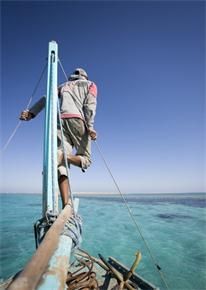Bringing science to your door step
When we talk about our scientific achievements and findings most people wonder if this is useful at all for them in their daily lives. Of course it is! But science is not always easy to be simplified. However, this will be one of the main tasks for the coastal survey team in the New Year. As a project funded by HEPCA, the main aim is to conserve and protect the natural resources of the Red Sea. To do so first of all we had to identify these resources, as we will not be able to protect something that we do not know much about. Where are they? Why are they sensitive? Why are they important? The importance of our natural resources is not only scientific but also economical. The Red Sea is the main and sometimes the only source of income for people working in tourism and fishing. The rich and diverse coral reef ecosystem is the main tourist attraction in the area. If these resources are lost it will not only be a scientific catastrophe but also a social disaster. This example demonstrates why our scientific research on coral reefs and associated animals is also important for you. The second phase of our coastal survey project was to identify the different sources of impact on our natural resources in order to minimize or eliminate them. Irresponsible behavior towards the marine life is the main sources of impact along the southern coast of the Egyptian Red Sea. It is not only our all duty to record or investigate environmental violations but also to stop them. One of our new tasks in 2012 will be an awareness campaign targeting dive guides and the local community. The main scope of the campaign is to raise a sense of ownership to our natural marine resources, highlight their biological and economical importance and those impacts that might endanger them. HEPCA will organize these campaigns to visit local schools, community people, hotels and dive centers. Another environmental and economic issue that the coastal survey team will tackle in 2012 is the overfishing and destructive fishing techniques. Sustainability, in other words allowing nature to recover from what we remove, has an impact on everyone. Local fishermen and even ordinary people can tell you how the fish stock and catch have decreased dramatically in the last few years. The depletion of goat fish, emperor fish and parrot fish are few examples of how an unorganized fishing industry makes the sea suffer. The massive decrease of the fish stock will have a long term impact on the community. For example: imagine that a fisherman today catches 10 kilos of fish/day and has an income of 50 LE/day. If the stock continues to decrease the same way and his son decides to stay in the family business, he will catch less than 2 kilos/fish/day, which will not be enough to feed him or his family. Again the effects of overfishing will not only affect the fishing industry; the tourism industry will be also affected. Tourists are coming to see a variety of fish and marine animals in the Red Sea; all of these animals are connected and interrelated to each other. The absence of one will affect the whole system negatively. We are collecting data on fish abundance and distribution; we will also collect data on different commercial fish species and use fisheries assessment soft wear to produce a sustainable management plan for all the commercial fish species in the Red Sea. The management plan will be handed to stake holders in the governorate with a summary available on our website for the public. More activities are to come in 2012 by which we will try to bring science to your door step and make sure that you will participate in collecting some scientific data yourself.



